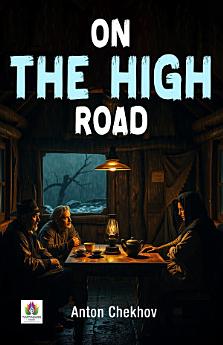On the High Road
About this ebook
The narrative follows a group of passengers on a rural road who find themselves sharing a cart, representing various strata of Russian society. As they travel toward their destination, Chekhov masterfully weaves together their interactions and conversations, revealing not only their personalities but also broader social commentary that reflects the tensions and realities of the time. At first glance, the setting may appear commonplace, but Chekhov transforms this seemingly mundane circumstance into a rich tableau that reveals profound truths about human nature.
Among the main characters, we find a disgruntled merchant, a genial but naïve tour guide, and a frivolous young woman, each imparting their perspectives on life, love, and ambition as they engage with one another during their journey. Chekhov's sharp wit and subtle irony shine through in their dialogue, showcasing his talent for creating multidimensional characters who are both relatable and enigmatic. As the conversations unfold, readers are drawn into their lives, forging emotional connections that speak to universal themes of longing, regret, and the quest for meaning.
One of the striking aspects of *On the High Road* is its exploration of the passage of time and the fleeting nature of happiness. Throughout their journey, the characters grapple with their dreams and aspirations, often facing the disillusionment that accompanies the passage of time. The story subtly conveys the idea that life is a series of choices that lead to unexpected outcomes, leaving individuals to ponder their paths and the relationships they've forged along the way. Through the lens of Chekhov's characters, we resonate with their struggles, aspirations, and the realization that the journey itself is as significant as the destination.
Additionally, Chekhov paints a vivid picture of the Russian landscape, infusing the story with a sense of place that enhances the narrative’s emotional impact. The rich descriptions of the environment, the sounds of nature, and the ever-changing scenery serve as a backdrop for the characters' internal dialogues, reinforcing the themes of longing and introspection. The simplicity of the rural setting contrasts sharply with the complexities of the emotional experiences unfolding within the cart, creating a tapestry of life that is both beautiful and tragic.
As the journey progresses, Chekhov emphasizes the importance of human connection and the shared experience of vulnerability. The passengers’ interactions evolve into a microcosm of society, where hierarchies, prejudices, and social norms surface and dissipate. It is within these moments of authenticity, where characters reveal their fears, dreams, and insecurities, that the true essence of humanity is portrayed. Chekhov’s ability to empathetically capture the nuances of human experience is what makes *On the High Road* a compelling read, leading to moments of both laughter and reflection.
Moreover, the layers of social commentary embedded in the narrative reflect Chekhov's own views on the changing dynamics of Russian society. Through the contrasting perspectives of the characters, Chekhov critiques the rigid class structures of his time while also revealing the universal nature of human desires and aspirations regardless of social standing. The richness of the dialogue and the revealing subtext showcase Chekhov's belief that everyday moments often hold greater significance than grand gestures, emphasizing the reality of human connectivity in a multifaceted world.
Ultimately, *On the High Road* exemplifies Anton Chekhov’s literary genius and his ability to weave together intricate narratives that delve into the hearts and minds of his characters. The story transcends its setting and period, resonating deeply with readers who seek to understand the complexities of life and the intricate web of human interactions. With its poignant blend of humor, sadness, and profound insight into the human experience, this short story remains a timeless reflection on the journey of life, the importance of empathy, and the inescapable realities we all face.








